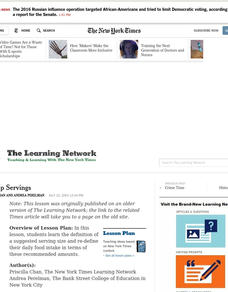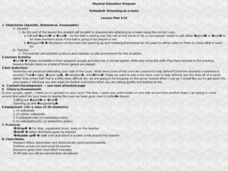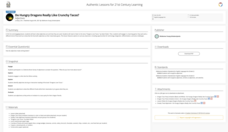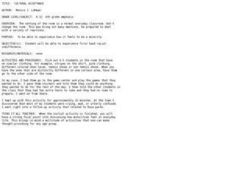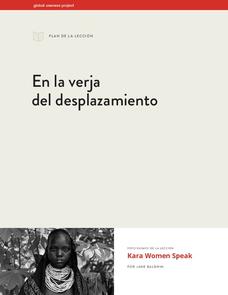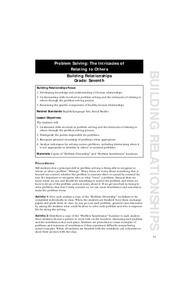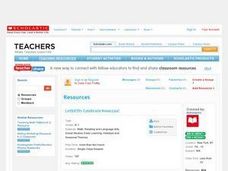Baylor College
Serving Sizes
Are serving sizes for different foods always appropriate for what you need? In this hands-on activity, learners work in groups to estimate what one serving size of various foods are, and then evaluate their hypotheses by measuring real...
Curated OER
Volleyball - Lesson 16 - Serve Receive
A strong volleyball lesson cover positioning for serve receive and transitioning from those positions to offensive attack. There are many ways to set up for serve receive depending on the rotation of the group and the skills of the...
Curated OER
Sizing Up Servings
Students learn the definition of a suggested serving size and re-define their daily food intake in terms of these recommended amounts.
BioEd Online
Serving Sizes
When it comes to eating a balanced diet, portion control is paramount, but what is the difference between the serving size on the nutrition facts label and a portion as determined by the USDA? In a comprehensive look at portion control,...
NortheastLeaders.org
The Ingredients of My Leadership and Serving Up the Ultimate Leader
What qualities make a good leader? The activities in this packet are designed for a convention of recognized school leaders but could easily be adapted to any classroom. Groups generate a list of qualities they believe are essential for...
Curated OER
A Serving By Any Other Name
Students examine the information given on food labels. They also discover what a serving size is and determine how much they eat over the suggested serving. They also calculate the number of calories are in different foods.
Curated OER
Volleyball - Lesson 12 - Attacking as a Team
Volleyball Lesson 12 focuses on team work and communication. Helping each other identify balls that are in play or if the ball is going out of play, by calling out loud - in, or, out. The more communication there is amongst team players...
Civil War Trust
Civil War Play
Raise the curtain to a class play that depicts the Civil War through both factual information and literary devices. The performance showcases the Battle of Antietam (Battle of Sharpsburg) and brings attention to women's roles, as well as...
Code.org
Personal Innovations
Here's a resource designed to serve as an introduction to a computer science course. Groups brainstorm an innovation that may improve technology or use technology to solve a problem. The plan guides the teacher through the introduction...
K20 LEARN
Do Hungry Dragons Really Like Crunchy Tacos?: Adjectives
Tacos are the theme of a lesson all about adjectives. Scholars list as many adjectives as possible to describe tacos and play a game of Not Like the Others before reading Dragons Love Tacos by Adam Rubin. Peers guess their favorite foods...
Curated OER
Cultural Acceptance
Students are segregated into groups according to their clothing and experience first hand what it feels like to be a minority in everyday life. In this cultural acceptance lesson plan, students experience discrimination first hand....
Curated OER
Volleyball - Lesson 19 - Serve Receive
Lesson 19 of 20 in this extensive volleyball unit is about bringing it all together. Pass, set, hit! A volleyball players mantra. So practice, practice, practice. Practice receiving the ball and making a pass to the setter, who then sets...
Curated OER
To Protect And Serve? Debating Police Misconduct And Reform
Students discuss purpose of law enforcement, its relationship to the community it serves, and ways to combat police misconduct.
Curated OER
Plus One Volleyball
Plus one volleyball begins like a regular game of volleyball. The receiving team must play the ball twice on their side before returning it over the net. Now the serving team must play the ball three times before returning it over the...
American Chemical Society
Can Liquids Dissolve in Water?
How does food coloring work? Classes watch a demonstration showing liquids dissolving in liquids. In groups, they then explore the ability of other liquids to dissolve in water (alcohol, mineral oil, and corn syrup) by setting up and...
American Physiological Society
Sticky Adaptations A Lesson on Natural Selection
Now you see it, now you don't! The stick bug exhibits the ability to disappear into a wooded environment. Why does this adaptation manifest in some species, but not in others? Life science students explore animal adaptations in nature...
Missouri Department of Elementary
Color Your Community
Eighth graders work together to come up with a topic for a service learning project that engages all members of the school community. Groups then develop a dialogue and visit other classrooms to encourage other students to participate....
Curated OER
Why Does Service Matter?
Students determine how community members serve others. In this service learning lesson, students interview community members who volunteer by serving others. Students then determine how they could serve their community.
Global Oneness Project
On the Verge of Displacement
By having scholars tackle this interdisciplinary lesson, they'll see how social studies and environmental science are related as they explore the impact that the construction of a dam will have on the population and ecosystem of the Omo...
Teach Engineering
Both Fields at Once?
An MRI uses both a magnetic and electricity, so how do the two interact with each other? Class members observe the effects on a charged particle when it is subject to both an electrical and magnetic field. The teacher background...
Poetry Class
Writing a Monologue
The works of Carol Ann Duffy, Scottish poet and Britain's 2009 poet laureate, serve as a model for a writing activity that asks class members to select a character card, brainstorm lists of words, phrases, actions, and items associated...
Teach Engineering
Imagining DNA Structure
Let's get a closer look at DNA and other molecular structures. The first lesson in the series of four introduces a variety of imagining techniques that engineers and scientists use to visualize molecular structures. The resource presents...
Learning for Life
Building Relationships
Understanding how to relate to others and participate in healthy human relationships is an important life skill for young learners to develop. Learners will use the worksheets to discuss problem solving in human interactions, and how...
Curated OER
Let's Celebrate Kwanzaa!
Learn more about Kwanzaa with a celebratory lesson. As learners analyze My First Kwanzaa Book by Debbi Chocolate, they compare and contrast the celebration to other holiday traditions they know about. Next, they prepare and play a...




